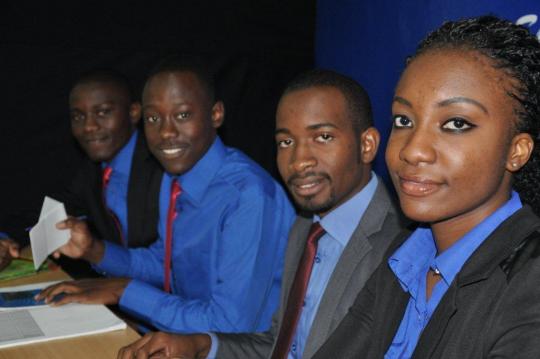Delia Banda is a student of Zambia’s Copperbelt University. She recently won “Best Debater” during
a televised debate series on jobs and unemployment
that was sponsored by the World Bank Zambia Country Office. The televised debate was focused on the country’s recent economic brief, “Zambia’s Jobs Challenge: Realities on the Ground.” In order to incentivize written discussion and to increase informed public debate on the jobs challenge in Zambia, the initiative included both a writing and debate competition on the topic of ‘Think Jobs’.
For her efforts she was awarded an internship at the Bank Office in Lusaka.
In this blog she shares her reflections on how the competition and subsequent internship impacted her.

As a Zambian youth passionate about the development of my country, I believe it is paramount that youth take part in finding new local solutions to a country’s socio-economic challenges. World over, young people are needed for development. We are the largest proportion of the population and are therefore most affected by our country’s challenges such as poverty and unemployment. This has given us the desire to inspire a change in the economic situation by getting involved now more than ever in political leadership and in community projects.
Currently in my last year of study at Copperbelt University, the idea of taking part in the development of my country not only empowers me in realizing my role as an agent of democratic change, but also empowers me personally. Being a productive and active member of civic life was one of the values imparted to me as part the Zambian school curriculum. I realize that young people have a critical role to play in social change, not just in the future as adults, but more immediately as active citizens today by designing, undertaking or contributing to individual or collective actions.
The debate competition sponsored by the World Bank Zambia country office gave me the rare opportunity to have my voice heard by millions. After hearing of the competition, four of my fellow students and I formed a debate team to discuss the topic of ‘think jobs’; the focus of the recently-launched Zambia economic update, ‘ Zambia’s Job Challenge: Realities on the Ground.’ The report highlights the current economic climate in the country, as well as the challenge of unemployment and job creation, a topic important to youth.
The World Bank provided debate training workshops, which were not just about debating, but also about learning more about the Bank. Like many other young people, I had only a faint idea of what the Bank really did in terms of operations. Thinking that the Bank operated like a commercial bank, the publications we saw and discussions we had dispelled this myth. Gone was the image of a Bank who provided loans to individuals with business or project proposals. Instead we learned that the Bank offers financial and technical assistance to governments, as well as reports and extensive information that helped us thoroughly prepare for the debates. Through the Think Jobs experience, we found out the Bank also works with civil society both in the provision of technical advice and in seeking solutions to the country’s challenges.
Meeting and interacting with the World Bank staff members is something I will never forget, as it made me feel remembered and included by influential development stakeholders. In the process, I learned that the Bank is not what I expected; the Bank team listened to us and responded positively to our suggestions. If I had any doubt before about feeling excluded from policy circles, this doubt evaporated when I saw the enthusiasm the Bank had for engaging with us. It is important for young people to be given an opportunity to interact with organizations that want to make positive changes in the economic state of our country.
Since the competition, a number of stakeholders have pledged to help youth in many ways that would guarantee that young people would at least come out of their comfort zones. Stakeholders have made this bold step because they have identified youth as an important component of national development today, not just in the future. It is thus important that young people are exposed to such programs because many are still ignorant as they discuss economic issues in their day to day lives.
Being provided with a platform to exercise my civic duties has made me realize the role I have to play within a community whose goal is the enrichment of society as a whole. Such a platform provides an alternative socio-intellectual challenge to the mind rarely provided for in my academic life. Before the competition, all I knew when it came to issues of jobs was that unemployment was the major problem. It was helpful to find out more challenges being faced in jobs such as the poor quality of jobs. Finding out the major jobs challenge opens up our minds as young people to redirect out focus on the quality of jobs because in recent times unemployment has been our outcry, especially in the 2011 Zambia general elections.
The fact that the final debate was aired on television gave us an opportunity to showcase our public speaking skills and also to disseminate vital information to millions of Zambians who tuned in. It is important for development agencies such as the World Bank to continue to reach out to young people because we provide new ideas and voices that will stimulate enthusiasm and investment in community structures.
Youth represent some of the most dynamic, creative and talented people in today’s societies, yet at the same time we often represent some of the most vulnerable and most powerless in the labor market. As we are brought into and connected with such organizations that we have traditionally been excluded from, we can participate in active and equal decision-making at a high level and will therefore move from being inactive citizens to fully engaged stakeholders in developing our country.
To read more from the competition participants, take a look at the Think Jobs Facebook page and check out the “ Think Jobs: Youth Respond ” magazine.
In this blog she shares her reflections on how the competition and subsequent internship impacted her.

As a Zambian youth passionate about the development of my country, I believe it is paramount that youth take part in finding new local solutions to a country’s socio-economic challenges. World over, young people are needed for development. We are the largest proportion of the population and are therefore most affected by our country’s challenges such as poverty and unemployment. This has given us the desire to inspire a change in the economic situation by getting involved now more than ever in political leadership and in community projects.
Currently in my last year of study at Copperbelt University, the idea of taking part in the development of my country not only empowers me in realizing my role as an agent of democratic change, but also empowers me personally. Being a productive and active member of civic life was one of the values imparted to me as part the Zambian school curriculum. I realize that young people have a critical role to play in social change, not just in the future as adults, but more immediately as active citizens today by designing, undertaking or contributing to individual or collective actions.
The debate competition sponsored by the World Bank Zambia country office gave me the rare opportunity to have my voice heard by millions. After hearing of the competition, four of my fellow students and I formed a debate team to discuss the topic of ‘think jobs’; the focus of the recently-launched Zambia economic update, ‘ Zambia’s Job Challenge: Realities on the Ground.’ The report highlights the current economic climate in the country, as well as the challenge of unemployment and job creation, a topic important to youth.
The World Bank provided debate training workshops, which were not just about debating, but also about learning more about the Bank. Like many other young people, I had only a faint idea of what the Bank really did in terms of operations. Thinking that the Bank operated like a commercial bank, the publications we saw and discussions we had dispelled this myth. Gone was the image of a Bank who provided loans to individuals with business or project proposals. Instead we learned that the Bank offers financial and technical assistance to governments, as well as reports and extensive information that helped us thoroughly prepare for the debates. Through the Think Jobs experience, we found out the Bank also works with civil society both in the provision of technical advice and in seeking solutions to the country’s challenges.
Meeting and interacting with the World Bank staff members is something I will never forget, as it made me feel remembered and included by influential development stakeholders. In the process, I learned that the Bank is not what I expected; the Bank team listened to us and responded positively to our suggestions. If I had any doubt before about feeling excluded from policy circles, this doubt evaporated when I saw the enthusiasm the Bank had for engaging with us. It is important for young people to be given an opportunity to interact with organizations that want to make positive changes in the economic state of our country.
Since the competition, a number of stakeholders have pledged to help youth in many ways that would guarantee that young people would at least come out of their comfort zones. Stakeholders have made this bold step because they have identified youth as an important component of national development today, not just in the future. It is thus important that young people are exposed to such programs because many are still ignorant as they discuss economic issues in their day to day lives.
Being provided with a platform to exercise my civic duties has made me realize the role I have to play within a community whose goal is the enrichment of society as a whole. Such a platform provides an alternative socio-intellectual challenge to the mind rarely provided for in my academic life. Before the competition, all I knew when it came to issues of jobs was that unemployment was the major problem. It was helpful to find out more challenges being faced in jobs such as the poor quality of jobs. Finding out the major jobs challenge opens up our minds as young people to redirect out focus on the quality of jobs because in recent times unemployment has been our outcry, especially in the 2011 Zambia general elections.
The fact that the final debate was aired on television gave us an opportunity to showcase our public speaking skills and also to disseminate vital information to millions of Zambians who tuned in. It is important for development agencies such as the World Bank to continue to reach out to young people because we provide new ideas and voices that will stimulate enthusiasm and investment in community structures.
Youth represent some of the most dynamic, creative and talented people in today’s societies, yet at the same time we often represent some of the most vulnerable and most powerless in the labor market. As we are brought into and connected with such organizations that we have traditionally been excluded from, we can participate in active and equal decision-making at a high level and will therefore move from being inactive citizens to fully engaged stakeholders in developing our country.
To read more from the competition participants, take a look at the Think Jobs Facebook page and check out the “ Think Jobs: Youth Respond ” magazine.


Join the Conversation